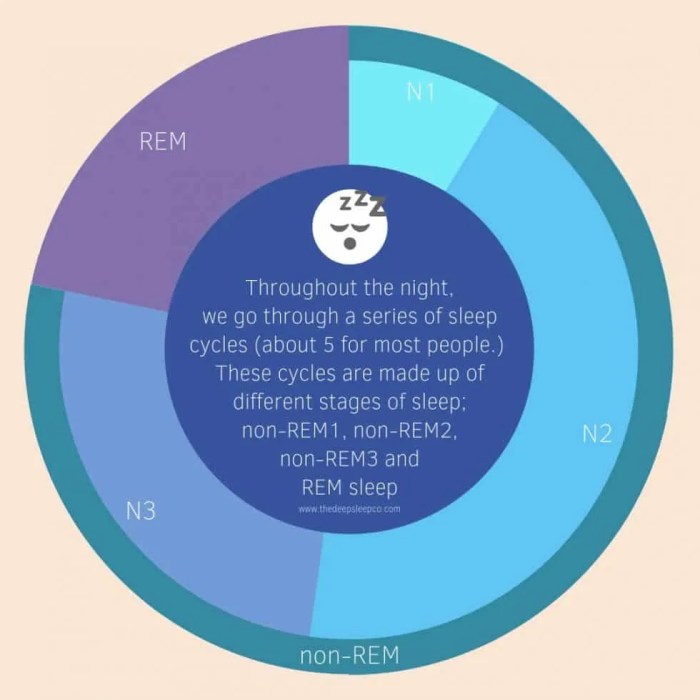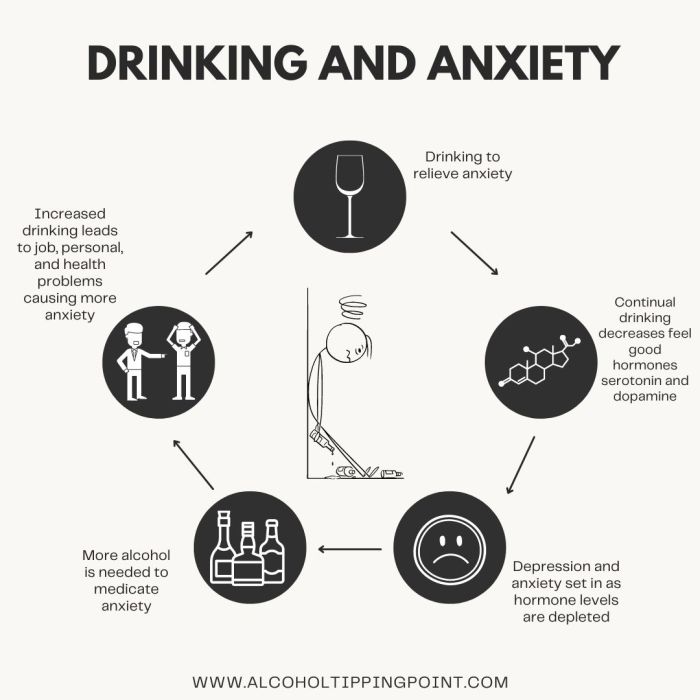
Lack of sleep signs manifest in various ways, impacting everything from your physical health to your mental well-being. This exploration delves into the diverse symptoms, from subtle physical changes to significant behavioral shifts, and how they differ across age groups and specific populations. We’ll uncover the intricate connections between sleep deprivation and daily functioning, emotional health, and even work performance.
The discussion covers everything from observable physical symptoms to cognitive impairments, and explores how sleep deprivation affects specific populations like pregnant women and shift workers. We’ll also examine strategies for improving sleep hygiene and mitigating the negative effects of insufficient rest on overall health.
Physical Signs of Sleep Deprivation
Sleep deprivation, a common yet often underestimated health concern, manifests in a multitude of physical ways. These signs, ranging from subtle discomfort to severe impairment, can affect various body systems, and their severity correlates directly with the duration and intensity of sleep loss. Understanding these physical manifestations is crucial for recognizing the importance of adequate sleep and seeking help when necessary.
Cardiovascular System
Sleep deprivation significantly impacts cardiovascular health. Chronic sleep loss can increase the risk of hypertension, or high blood pressure, due to disruptions in the body’s natural blood pressure regulation mechanisms. This, in turn, can lead to an increased risk of heart disease and stroke. Additionally, sleep deprivation has been linked to irregularities in heart rate and rhythm, which can manifest as palpitations or arrhythmias.
- Mild: Occasional palpitations or slight fluctuations in blood pressure.
- Moderate: Increased blood pressure readings, more frequent palpitations, and noticeable fatigue.
- Severe: Persistent high blood pressure, irregular heartbeat requiring medical intervention, and severe cardiovascular complications.
Infants may display subtle changes in feeding patterns and irritability. Adolescents might experience headaches and dizziness, while adults might notice increased blood pressure readings and difficulty concentrating.
Neurological System
The neurological system is profoundly affected by sleep deprivation. Lack of sleep directly impacts cognitive functions such as memory, concentration, and reaction time. Reduced cognitive function can lead to impaired judgment and decision-making, and in severe cases, hallucinations and delusions.
- Mild: Difficulty concentrating, slight memory lapses, and increased irritability.
- Moderate: Significant lapses in memory, decreased attention span, and noticeable mood swings.
- Severe: Hallucinations, delusions, and potentially life-threatening confusion, impacting decision-making.
Infants might display restlessness and feeding difficulties, while adolescents might experience difficulty with schoolwork and mood swings. Adults may notice impaired driving skills and difficulty with tasks requiring high concentration.
Musculoskeletal System
Sleep deprivation can negatively affect the musculoskeletal system. Insufficient sleep can lead to muscle tension, aches, and pains, potentially contributing to chronic pain conditions. Muscle weakness and coordination issues can also arise from extended periods of sleep deprivation.
- Mild: Muscle tension, occasional headaches, and minor aches and pains.
- Moderate: Persistent muscle aches and pains, difficulty with physical tasks, and noticeable stiffness.
- Severe: Severe muscle spasms, significant difficulty with movement, and potential for injury.
Infants might exhibit increased irritability and difficulty with motor skill development. Adolescents might experience muscle cramps and back pain, while adults might experience more frequent muscle aches and pains, potentially contributing to chronic pain.
Comparison of Acute and Chronic Sleep Deprivation
| Characteristic | Acute Sleep Deprivation | Chronic Sleep Deprivation |
|---|---|---|
| Duration | Short-term sleep loss (e.g., one or two nights) | Long-term sleep loss (e.g., weeks, months, or years) |
| Physical Signs | Fatigue, irritability, difficulty concentrating, and minor headaches | Increased risk of chronic diseases (e.g., cardiovascular disease, diabetes), impaired immune function, and persistent fatigue |
| Severity | Potentially reversible with adequate sleep | Often more severe and persistent, requiring more significant intervention and potentially leading to long-term health consequences |
| Examples | Difficulty concentrating during a late-night study session, experiencing a headache after a night of poor sleep | Experiencing chronic fatigue, difficulty performing daily tasks, and increased risk of accidents or injuries |
Cognitive and Behavioral Changes: Lack Of Sleep Signs
Insufficient sleep significantly impacts our cognitive functions and behaviors, affecting everything from concentration and memory to mood and social interactions. These changes aren’t subtle; they can dramatically reduce productivity, impair decision-making, and even lead to serious interpersonal conflicts. Understanding these effects is crucial for prioritizing sleep and promoting overall well-being.The human brain requires adequate rest to function optimally.
When deprived of sleep, the brain struggles to process information effectively, leading to a cascade of cognitive and behavioral consequences. This includes difficulty focusing, remembering details, and making sound judgments. Beyond the cognitive realm, sleep deprivation can also trigger emotional instability, heightened irritability, and impulsive actions. These changes can have a profound impact on our relationships and daily lives.
Cognitive Impairments
Cognitive functions, such as attention, memory, and decision-making, are directly influenced by sleep quality and quantity. Chronic sleep deprivation can impair these abilities, leading to decreased performance in various tasks and situations. For instance, reduced concentration can manifest as difficulty following conversations or completing work assignments. Memory issues can result in forgetting appointments, misplacing items, or struggling to recall important information.
Impaired decision-making can lead to poor choices, increased risk-taking, and difficulty evaluating complex situations.
Feeling sluggish and irritable? Those could be signs of a lack of sleep. Interestingly, when you start truly enjoying your own company, as detailed in this article about when you start enjoy being alone these 10 things will happen , you might find your energy levels increasing, and thus, less likely to experience those tell-tale signs of sleep deprivation.
So, pay attention to how much you’re sleeping; a good night’s rest is key to a happier, more productive you!
Behavioral Alterations
Sleep deprivation often triggers noticeable behavioral changes. Mood swings, ranging from mild irritability to severe outbursts, are common consequences of insufficient sleep. Irritability can manifest in various ways, from impatience with others to outbursts of anger. Furthermore, sleep deprivation can contribute to increased impulsivity, leading to hasty decisions or actions without considering the potential consequences.
Impact on Emotional Regulation
Adequate sleep is essential for maintaining emotional stability. Sleep deprivation disrupts the delicate balance of neurochemicals in the brain, affecting emotional regulation. This can result in heightened emotional responses, difficulty managing stress, and increased susceptibility to mood disorders. For example, individuals experiencing sleep deprivation might react with anger or frustration to situations that wouldn’t normally provoke such strong reactions.
Impact on Social Interactions
The effects of sleep deprivation extend to social interactions. Insufficient sleep can negatively impact social skills, communication effectiveness, and overall interpersonal interactions. Difficulty concentrating, maintaining focus, and managing emotions can lead to misunderstandings, conflicts, and strained relationships. For instance, a person who is sleep-deprived might have trouble understanding social cues, leading to inappropriate comments or behaviors.
Sleep and Cognitive Performance
| Hours of Sleep | Cognitive Performance Metrics |
|---|---|
| 7-9 hours | High concentration, excellent memory, sound decision-making, balanced mood |
| 5-6 hours | Reduced concentration, minor memory lapses, slightly impaired decision-making, potential for irritability |
| 4 hours or less | Significant concentration problems, impaired memory, poor decision-making, heightened irritability, increased impulsivity |
“Sleep is the best medicine.” – Unknown
Impact on Daily Function

Sleep deprivation significantly impacts daily life, hindering performance in various aspects, from work and studies to driving. The consequences extend beyond simple fatigue, impacting overall productivity and emotional well-being. Understanding these effects is crucial for developing strategies to combat sleep loss and maintain optimal functioning.The cumulative effect of insufficient sleep leads to a gradual decline in cognitive abilities, impacting decision-making, concentration, and reaction time.
This, in turn, directly affects daily tasks, often with unseen consequences on overall well-being. Strategies to mitigate the effects of sleep deprivation are therefore paramount in ensuring a productive and fulfilling life.
Work Performance Impairment
Insufficient sleep negatively affects work performance across diverse industries. Reduced alertness and concentration directly translate to decreased productivity and increased errors. The consequences are particularly evident in professions requiring complex cognitive tasks, quick reactions, and precise judgments. Examples include healthcare, aviation, and software development.
- Decreased Productivity: Studies show a strong correlation between sleep deprivation and reduced output. Employees struggling with sleep loss may experience decreased efficiency in completing tasks, leading to missed deadlines and compromised quality of work.
- Increased Errors: Sleep-deprived individuals often make more mistakes, impacting accuracy and precision in their work. This is particularly crucial in professions demanding high levels of attention to detail.
- Impaired Decision-Making: Lack of sleep compromises judgment and critical thinking. This can result in poor decisions, potentially leading to financial losses or other adverse outcomes in the workplace.
Driving Ability and Safety
Driving while sleep-deprived is extremely dangerous. Reduced alertness and impaired reaction time increase the risk of accidents. The consequences can be devastating, impacting not only the driver but also other road users.
- Impaired Reaction Time: Sleep deprivation significantly slows reaction time, making it harder to respond to unexpected situations on the road. This can lead to collisions or near-misses.
- Reduced Alertness: Sleep-deprived drivers are more prone to lapses in attention, which can cause them to lose focus on the road, potentially leading to accidents.
- Increased Risk of Accidents: Numerous studies have linked sleep deprivation to an increased risk of motor vehicle accidents, emphasizing the importance of adequate rest for safe driving.
Academic Performance
Students who consistently don’t get enough sleep experience significant academic challenges. Poor concentration and memory retention directly impact learning and comprehension. The cumulative effect can be a serious impediment to academic success.
- Reduced Learning Capacity: Insufficient sleep hampers a student’s ability to absorb new information, hindering learning and comprehension of complex subjects.
- Impaired Memory Retention: The brain needs sleep to consolidate memories. Lack of sleep can significantly impair the ability to recall information, affecting academic performance.
- Decreased Focus and Attention: Maintaining focus and attention in lectures or study sessions is significantly impacted by sleep deprivation. This leads to difficulty in comprehending and retaining the material.
Strategies to Mitigate the Impact
Implementing strategies to improve sleep quality and duration is essential for mitigating the impact of sleep deprivation on daily tasks. These strategies range from lifestyle modifications to seeking professional guidance.
- Establishing a Regular Sleep Schedule: Consistency in sleep and wake times helps regulate the body’s natural sleep-wake cycle, improving sleep quality.
- Creating a Relaxing Bedtime Routine: A calming bedtime routine can help signal to the body that it’s time to sleep, promoting relaxation and sleep onset.
- Creating a Conducive Sleep Environment: A dark, quiet, and cool bedroom environment can significantly improve sleep quality. Reducing light and noise exposure is crucial.
- Seeking Professional Help: In cases of persistent sleep problems, seeking professional guidance from a sleep specialist can be beneficial.
Impact on Productivity in Different Work Environments
The impact of sleep deprivation varies across different work environments.
| Work Environment | Impact of Sleep Deprivation |
|---|---|
| Call Center | Reduced customer service quality, increased call handling errors, and slower response times. |
| Manufacturing | Increased error rates, reduced productivity, and potential safety hazards. |
| Healthcare | Decreased vigilance, slower reaction times, increased medical errors, and compromised patient safety. |
| Software Development | Reduced problem-solving abilities, decreased debugging efficiency, and potential software defects. |
Emotional and Mental Health Consequences
Sleep deprivation isn’t just about feeling tired; it significantly impacts our emotional and mental well-being. Chronic lack of sleep can exacerbate existing mental health conditions and even contribute to the development of new ones. Understanding this link is crucial for prioritizing sleep and maintaining overall health.The intricate relationship between sleep and mental health is well-documented. Studies consistently show a strong correlation between insufficient sleep and increased risk of developing or experiencing symptoms of anxiety, depression, and mood disorders.
Disruptions in sleep patterns can affect the delicate balance of neurochemicals in the brain, impacting mood regulation and emotional responses.
Relationship with Mental Health Conditions
Sleep deprivation acts as a significant stressor on the body and mind. This stress can worsen pre-existing conditions like anxiety and depression, or even contribute to their onset. A lack of restorative sleep can disrupt the brain’s natural mechanisms for regulating mood, making individuals more susceptible to experiencing heightened anxiety, feelings of sadness, and irritability. For instance, individuals with pre-existing anxiety may find that their symptoms intensify with chronic sleep deprivation, leading to more frequent panic attacks or heightened worry.
Similarly, individuals with depression may experience a worsening of their symptoms, including loss of interest in activities, fatigue, and feelings of hopelessness.
Emotional Responses to Sleep Deprivation
Emotional responses to sleep deprivation vary considerably across individuals, influenced by pre-existing personality traits and emotional states. Extroverted individuals might exhibit heightened sociability and impulsiveness, while introverts might experience increased feelings of isolation and withdrawal. Those who are generally anxious may experience heightened irritability and difficulty managing stress. Conversely, individuals predisposed to calmness might find themselves more easily overwhelmed by stressful situations.
This demonstrates the complex interplay between sleep deprivation and individual emotional makeup.
Emotional and Mental Health Indicators
Identifying indicators of sleep deprivation-related emotional and mental health issues is crucial for early intervention and support.
- Increased irritability and frustration: A frequent and noticeable increase in irritability and difficulty tolerating minor frustrations can be a clear sign of sleep deprivation. Individuals might find themselves easily angered or frustrated by situations that would normally not provoke such strong reactions.
- Difficulty concentrating and focusing: A decline in cognitive function, including difficulty concentrating and focusing, is often linked to sleep deprivation. This can significantly impact daily tasks and overall productivity.
- Reduced emotional regulation: Sleep deprivation can make it challenging to manage emotions effectively. Individuals might experience heightened emotional reactivity, leading to impulsive behaviors or difficulty controlling outbursts.
- Increased feelings of sadness, hopelessness, or worthlessness: A significant shift towards negative emotional states, including feelings of sadness, hopelessness, or worthlessness, can be indicative of sleep deprivation’s impact on mood regulation.
- Heightened anxiety and worry: Increased anxiety, worry, and heightened vigilance are frequently observed in sleep-deprived individuals. This can manifest in physical symptoms like racing heart or difficulty relaxing.
Strategies for Improving Emotional Well-being
Addressing emotional well-being when sleep is insufficient requires a multi-pronged approach.
- Prioritizing sleep hygiene: Establishing a regular sleep schedule, creating a relaxing bedtime routine, and optimizing the sleep environment can significantly improve sleep quality.
- Stress management techniques: Incorporating stress-reducing activities like meditation, deep breathing exercises, or yoga can help regulate emotional responses and reduce the negative impact of sleep deprivation.
- Seeking professional support: If emotional or mental health issues persist despite lifestyle changes, seeking professional help from a therapist or counselor is essential.
- Mindfulness and self-compassion: Practicing mindfulness and cultivating self-compassion can help individuals navigate challenging emotional states associated with sleep deprivation with greater resilience.
Sleep Deprivation in Specific Populations
Sleep deprivation isn’t a uniform experience; its effects vary significantly across different demographics. Understanding these variations is crucial for developing targeted interventions and promoting better sleep hygiene. Specific populations, like pregnant women, shift workers, and those with pre-existing health conditions, face unique challenges in maintaining adequate sleep, and these challenges can have profound consequences. This section explores these nuances, examining the diverse impact of sleep deprivation on various groups and offering practical considerations for managing sleep in these vulnerable populations.Pregnant women, shift workers, and individuals with pre-existing health conditions face unique vulnerabilities to sleep deprivation’s negative effects.
Factors like hormonal changes, work schedules, and underlying health issues can exacerbate the impact of insufficient sleep. A deeper understanding of these challenges is essential for creating targeted strategies to support healthy sleep in these groups.
Feeling sluggish and easily distracted? Lack of sleep can manifest in surprising ways, impacting your focus and productivity. This often leads to the kinds of behaviors exhibited by unfocused individuals, such as procrastination and difficulty concentrating. For a deeper dive into these habits, check out this insightful article on 10 habits highly unfocused people. Understanding these tendencies can help you identify potential sleep-related issues and address them proactively, ultimately improving your overall well-being.
Unique Effects on Pregnant Women
Pregnancy brings about significant physiological and hormonal shifts, often disrupting sleep patterns. Morning sickness, discomfort, and the growing fetus can all contribute to sleep disturbances. These sleep disruptions can have cascading effects on the mother’s physical and mental well-being and, critically, on the developing fetus. Studies have shown a correlation between sleep deprivation in pregnant women and an increased risk of complications like gestational diabetes and preeclampsia.
The importance of adequate sleep during pregnancy cannot be overstated.
Unique Effects on Shift Workers
Shift workers, due to their non-standard work schedules, frequently experience misalignment between their internal body clock and external work demands. This mismatch can lead to chronic sleep deprivation, affecting their alertness, concentration, and overall health. The irregular sleep patterns of shift workers often result in insufficient sleep duration and poor sleep quality, increasing their susceptibility to various health problems.
A common example includes an increased risk of accidents and errors in jobs requiring vigilance, such as driving or operating machinery.
Unique Effects on Individuals with Pre-existing Health Conditions
Individuals with pre-existing health conditions, such as chronic pain, asthma, or heart disease, may experience a heightened sensitivity to the effects of sleep deprivation. These conditions can significantly impact sleep quality, leading to a vicious cycle where poor sleep exacerbates existing health issues. Furthermore, sleep deprivation can impede the body’s ability to heal and recover, making managing pre-existing conditions even more challenging.
Comparative Analysis of Sleep Deprivation Across Developmental Stages
The impact of sleep deprivation varies across different developmental stages. Infants and children require significantly more sleep than adults to support growth and development. Adequate sleep is critical for cognitive function, emotional regulation, and physical development in these stages. Conversely, adolescents and young adults face unique sleep challenges related to biological changes and lifestyle choices, potentially impacting their mental health and academic performance.
A comparative analysis reveals the critical role of sleep at each stage.
Factors Exacerbating the Impact of Sleep Deprivation on Vulnerable Populations
Several factors can exacerbate the negative consequences of sleep deprivation in vulnerable populations. Financial pressures, social isolation, and lack of access to healthcare resources can contribute to poor sleep habits and limit the ability to address sleep-related issues. These factors often intersect and compound the impact on individuals’ overall health and well-being.
Considerations for Managing Sleep in Specific Groups
| Population Group | Specific Considerations |
|---|---|
| Pregnant Women | Prioritizing prenatal care, addressing discomfort, and promoting relaxation techniques like yoga or meditation. Encouraging a consistent sleep schedule and ensuring access to support groups or counseling services. |
| Shift Workers | Implementing strategies to synchronize work schedules with their natural sleep-wake cycles, including adjusting shift timings, and promoting adequate rest periods. Offering education and resources on optimizing sleep hygiene and providing support for their health and safety. |
| Individuals with Pre-existing Health Conditions | Collaborating with healthcare providers to develop personalized sleep strategies, including medications and lifestyle modifications. Managing stress, promoting healthy sleep hygiene, and ensuring access to support services to address the interplay between sleep and health conditions. |
Illustrative Examples of Sleep Deprivation
Sleep deprivation, a pervasive issue in modern life, manifests in myriad ways, impacting physical health, cognitive function, and emotional well-being. Understanding these manifestations through illustrative examples can highlight the profound consequences of insufficient sleep. Recognizing the symptoms in ourselves and others is crucial for promoting better sleep habits and overall health.
A Day in the Life of a Moderately Sleep-Deprived Person
The effects of moderate sleep deprivation are often insidious, slowly eroding one’s ability to function optimally. Consider Sarah, a working mother who consistently gets only 5 hours of sleep per night. Her day begins with a rushed morning, juggling breakfast, getting her children ready for school, and rushing to work. Throughout the day, she experiences difficulty concentrating, feeling easily frustrated, and struggling to maintain focus during meetings.
Feeling sluggish and irritable? Experiencing trouble focusing? These are common signs of sleep deprivation. While it’s easy to overlook the impact of insufficient sleep, it’s crucial to remember that sleep is one of the 2 most important things never take granted in life, impacting everything from our physical health to our mental clarity. Taking care of your sleep hygiene is key to overall well-being, and recognizing the signs of a sleep deficit is a great first step in prioritizing your health.
2 important things never take granted Knowing how to recognize the signs will allow you to make adjustments and get the sleep you need to function optimally. Ultimately, prioritizing sleep is a crucial part of maintaining a healthy lifestyle.
Her memory lapses, making it hard to recall details or instructions. She frequently makes mistakes at work, and her usual efficiency is compromised. At home, her patience is thin, leading to arguments with her children and spouse. By the end of the day, she feels drained and overwhelmed, making healthy food choices nearly impossible. Her social life suffers, as she feels too exhausted to participate in activities.
This exemplifies how moderate sleep deprivation can significantly impact daily life.
Impact on Interpersonal Relationships
Insufficient sleep can strain interpersonal relationships in numerous ways. A lack of sleep often leads to irritability, mood swings, and heightened sensitivity to perceived slights. This can create conflict with partners, family members, and friends. For instance, a chronically sleep-deprived individual might become easily angered or defensive, leading to misunderstandings and arguments. Their reduced patience and increased frustration can lead to social isolation, as interactions become fraught with tension.
Their lack of focus and memory issues can also lead to missed appointments, forgotten details, and hurt feelings. These interactions, in turn, can further exacerbate feelings of isolation and negatively impact the relationship.
Adequate Sleep and Healthy Lifestyle Choices
Adequate sleep is foundational to maintaining a healthy lifestyle. Consider David, a young professional who prioritizes sleep. He understands the crucial link between sleep and well-being. He consistently gets 7-8 hours of sleep each night. This allows him to have the energy to exercise regularly, eat nutritious meals, and manage stress effectively.
He’s more focused at work, and his improved cognitive function allows him to make sound decisions. He also has the emotional resilience to manage challenges without succumbing to frustration or burnout. He has the energy to maintain a balanced social life. This scenario highlights the positive correlation between adequate sleep and the ability to maintain healthy lifestyle choices.
A Workplace Culture of Sleep Deprivation
A workplace characterized by chronic sleep deprivation often manifests in a hostile work environment. Imagine a call center where employees routinely work 12-hour shifts, with little to no time for sleep. The workspace is dimly lit, with a pervasive atmosphere of exhaustion. Staff morale is low, and productivity is significantly hampered. Errors in judgment and missed deadlines are frequent.
Teamwork suffers, as communication breaks down amidst the constant fatigue. Employee turnover is high, as workers seek more conducive environments. The lack of rest significantly impacts decision-making, problem-solving, and overall work performance. This example illustrates the profound impact of pervasive sleep deprivation on a workplace environment.
Methods for Improving Sleep
Getting enough quality sleep is crucial for overall well-being. It impacts everything from physical health to mental clarity and emotional regulation. Fortunately, there are evidence-based strategies you can implement to cultivate better sleep habits. Understanding the interconnectedness of diet, exercise, stress, and environment is key to achieving consistent, restful sleep.Improving sleep is not a one-size-fits-all solution. What works for one person might not work for another.
However, by exploring different approaches and finding what resonates with you, you can create a personalized sleep routine that fosters deep, restorative rest.
Dietary Influences on Sleep
A healthy diet plays a significant role in sleep quality. Consuming a balanced diet rich in nutrients can contribute to better sleep. Conversely, certain dietary choices can negatively affect sleep patterns. The timing of meals, particularly heavy meals close to bedtime, can impact sleep quality.
- Evening Meals: Avoid large, heavy meals and sugary snacks close to bedtime. These can lead to digestive discomfort and disrupt sleep. Instead, opt for lighter meals a few hours before sleep.
- Hydration: Adequate hydration is important for overall health, but excessive fluid intake before bed can lead to frequent nighttime awakenings for bathroom trips. Drink plenty of fluids throughout the day, but reduce intake closer to bedtime.
- Nutrient-Rich Diet: Focus on a diet rich in magnesium, calcium, and tryptophan. These nutrients can promote relaxation and sleep. Include foods like leafy greens, dairy products, and nuts in your diet.
Exercise and Sleep Quality
Regular physical activity is beneficial for sleep. Exercise promotes better sleep by reducing stress and improving mood. However, timing is crucial. Vigorous exercise too close to bedtime might interfere with sleep onset.
- Timing of Exercise: Schedule exercise at least a few hours before bedtime. This allows your body time to cool down and prepare for sleep. Gentle exercise, like a relaxing walk, can be done closer to bedtime if it promotes relaxation.
- Consistency: Regular exercise, whether it’s a daily walk, a yoga session, or a gym workout, helps regulate your body’s natural sleep-wake cycle. Consistent physical activity improves sleep quality over time.
- Listen to Your Body: Pay attention to how your body reacts to different types of exercise. If vigorous exercise makes you feel overly stimulated, consider opting for more gentle forms of activity.
Stress Management and Sleep, Lack of sleep signs
Chronic stress can significantly disrupt sleep patterns. Effective stress management techniques can contribute to improved sleep quality. These techniques help regulate the body’s response to stress, allowing for better sleep.
- Mindfulness and Relaxation Techniques: Incorporating mindfulness practices, like meditation or deep breathing exercises, can help reduce stress and promote relaxation. These techniques can calm the mind and body, preparing them for sleep.
- Stress-Reducing Activities: Engage in activities that help you relax and de-stress, such as reading, listening to music, or spending time in nature. These activities can provide a mental and physical break from the stressors of daily life.
- Establish a Consistent Routine: Create a regular bedtime routine that signals to your body that it’s time to sleep. This routine should include calming activities that promote relaxation, such as taking a warm bath or reading a book.
Environmental Factors Affecting Sleep
Environmental factors, such as light, noise, and temperature, can significantly impact sleep quality. Creating a sleep-conducive environment is essential for optimal sleep.
- Darkness and Light: Darkness is crucial for melatonin production, a hormone that regulates sleep. Keep your bedroom dark and use blackout curtains or an eye mask to block out light. Minimize exposure to screens before bedtime.
- Noise Levels: Noise can disrupt sleep. Use earplugs or a white noise machine to minimize disruptive sounds. Choose a quiet and peaceful sleeping environment.
- Temperature: A cool room temperature is ideal for sleep. Adjust the thermostat to a comfortable temperature that promotes relaxation.
Actionable Steps for Better Sleep
Taking proactive steps to improve sleep hygiene can lead to significant improvements in sleep quality. These steps should be tailored to individual needs and preferences.
- Establish a Consistent Sleep Schedule: Go to bed and wake up at the same time every day, even on weekends, to regulate your body’s natural sleep-wake cycle.
- Create a Relaxing Bedtime Routine: Engage in calming activities before bed, such as taking a warm bath, reading, or listening to soothing music.
- Optimize Your Sleep Environment: Make sure your bedroom is dark, quiet, and cool. Use blackout curtains, earplugs, or a white noise machine as needed.
Visual Representations
Understanding the multifaceted impact of sleep deprivation requires more than just words. Visual representations can effectively communicate the complex interplay of its effects, making the information more accessible and memorable. Visual aids allow us to grasp the magnitude and interconnectedness of the issue in a way that textual descriptions alone cannot fully convey.Visual representations are crucial in conveying the progression of sleep deprivation’s effects, and the interconnectedness of sleep deprivation with various health issues.
By using visual cues like color, shape, and layout, we can transform complex information into a digestible format. This makes it easier to grasp the magnitude and interconnectedness of the issue.
Progression of Sleep Deprivation Effects
This infographic presents a visual representation of how sleep deprivation progressively impacts an individual. It uses a cascading effect to demonstrate the severity and interconnected nature of the consequences.
The infographic begins with a central figure representing a healthy individual with a well-rested sleep cycle. Surrounding this central figure are several interconnected circles representing various aspects of well-being, such as cognitive function, physical health, emotional stability, and daily productivity. Each circle is depicted in a vibrant color that signifies the positive state of each aspect. As the figure experiences sleep deprivation, the circles gradually dim and shrink, highlighting the deterioration of each aspect.
A darker shade of gray is used to represent the progression of sleep deprivation, darkening progressively as the severity of the deprivation increases. Arrows depict the cascading effect, showing how sleep deprivation impacts one area, which then negatively affects others.
Interconnectedness of Sleep Deprivation and Health Issues
This flowchart illustrates the interconnectedness of sleep deprivation and various health problems.
The flowchart uses a series of interconnected boxes to represent different health issues. The box at the top represents sleep deprivation, with a central symbol depicting a sleep-deprived individual. Each connected box, using different colors, depicts health issues such as obesity, cardiovascular disease, mental health disorders, weakened immunity, and accidents. Lines connecting the boxes visually represent the causal relationship.
Arrows indicate the direction of the impact, showing how sleep deprivation can lead to various health problems. The width of the connecting lines can vary to indicate the strength of the relationship, with thicker lines signifying a stronger connection between sleep deprivation and a particular health issue. For example, a thicker line might connect sleep deprivation to cardiovascular disease to highlight the strong link.
Closing Summary

In conclusion, understanding the diverse lack of sleep signs is crucial for prioritizing sleep health. Recognizing the physical, cognitive, behavioral, and emotional consequences empowers individuals to address sleep deprivation effectively. By implementing strategies for better sleep hygiene and seeking professional help when necessary, we can cultivate a healthier, more productive lifestyle.





